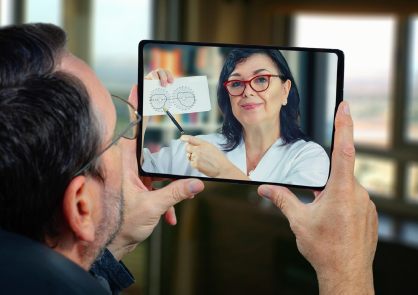Cataract, Refractive
CID: A New Pathway for Glaucoma Surgery
Telemedicine passes test for routine cataract follow-up

Dermot McGrath
Published: Thursday, June 1, 2023
“ 97% of patients said they were very satisfied with the video assessment. “
Dermot McGrath reports
Telemedicine software can provide a safe and effective means of following-up patients after routine cataract surgery, according to a recent UK study.
“Our experience showed the video consultation was effective, safe, accurate, and satisfactory in this cohort of patients following routine cataract surgery,” said Dr Lucia Pelosini. “There were no adverse effects or complications missed in the group subject to video consultation at two weeks compared to the patients reviewed in the clinic during the same period. The novel process of integrating remote video consultation into routine medical care has the advantage of reducing hospital attendance and the cost of travelling for patients.”
The current practice in the United Kingdom is to review the patient within two to four weeks after routine cataract surgery, usually in nurse-led clinics or with trainees in national healthcare institutions, Dr Pelosini noted.
“The COVID-19 pandemic has pushed us to look for alternative ways to follow our patients safely,” she said. “During the pandemic, we invested a lot of time in telephone consultations and follow up. This type of telephone follow-up after routine procedures has also been described in many other specialties.”
The telemedicine software (AOS, Advanced Ophthalmic Systems) allows the clinician to perform live video consultations, assess images of the anterior eye, and complete an interactive live visual acuity measurement following surgery.
“We wanted to look at this software, which combines the use of information obtained from the patient—equivalent to that obtained in a telephone conversation—but also adds some objective measurements,” she said.
Dr Pelosini’s study assessed the software in 65 patients at King’s College Hospital, London, two weeks after routine cataract surgery and compared this cohort with an equivalent group of patients who attended a face-to-face consultation two weeks after cataract surgery.
Patients selected for a follow-up by video consultation tended to be younger (73 years versus 85 years), have better general health, and be more familiar with using devices such as computers and smartphones. The video consultation allowed a reliable assessment of symptoms, compliance with medication, and examination of the external eye in all cases. Only 4% of patients seen by video consultation required a clinic review due to postoperative medicine intolerance. Some 85% of patients had a distance visual acuity of 6/12 (Snellen) or better, which is in line with normal cataract follow-up, Dr Pelosini said.
The vast majority (97%) of patients said they were very satisfied with the video assessment, while 3% said they were satisfied with the consultation but experienced some technical difficulties in the connection. There was no adverse effect or missed postoperative complications in the group assessed by video consultation when assessed at the final clinic review five weeks after surgery.
“The only real limitation in taking this approach is we lose some refractive outcomes for audit purposes of our surgery, and we also lose some opportunities for teaching junior doctors and nurses,” she said.
Dr Pelosini gave this presentation at the 27th ESCRS Winter Meeting in Vilamoura, Portugal.
Lucia Pelosini MD, FRCOphth is a Consultant Ophthalmic Surgeon at King’s College Hospital NHS Foundation Trust, Queen Mary’s Hospital, London. luciapelosini@googlemail.com or misspelosini@theclinic.co.uk
